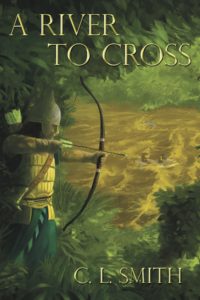How often when tragedy strikes, do we say a quick prayer and then flail about, grasping for something we can do to make things better? To human eyes, the physical realm often eclipses the spiritual—even to believers who affirm that God is the ultimate, everlasting, unchanging reality. Prayer too often seems our last resort.
The writer of Hebrews reminds us that “faith is confidence in what we hope for and assurance about what we do not see.”1 Then he goes on to tell stories, a long string of faith stories. Embedded in The Stones of Gilgal novels are many stories I’m guessing might have strengthened the faith of Biblical characters of that era. In the following exchange from my latest book, A River to Cross, Acsah, the independent daughter of Caleb, vents frustration over her expected role during the settlement of Canaan. Othniel responds with a story. A prayer story.
is confidence in what we hope for and assurance about what we do not see.”1 Then he goes on to tell stories, a long string of faith stories. Embedded in The Stones of Gilgal novels are many stories I’m guessing might have strengthened the faith of Biblical characters of that era. In the following exchange from my latest book, A River to Cross, Acsah, the independent daughter of Caleb, vents frustration over her expected role during the settlement of Canaan. Othniel responds with a story. A prayer story.
Excerpted from A River to Cross ~
“When you men went off for military drills in the wilderness, it was nothing. It was just a game. There were no wars or rumors of war. But, here in Canaan—it is different. Father expects there will be war and separation. You will go off for weeks or months fighting battles while we women and children are left behind. You will witness the wonders of God shining forth gloriously. But that is not what I will witness. I will know only grindstone and loom, cook fire, livestock, and garden. You will live miracles. I will live mundane monotony.” Acsah stopped and laughed at herself. “Not a very noble attitude, is it?”
Othniel stared into the distance for so long that Acsah wondered if he had even listened. At last he said, “I can understand how you might feel left behind. It reminds me of the contribution Hur made to the battle with the Amalekites long ago. As Joshua tells the story, Hur felt left behind when he was asked to accompany Moses and Aaron up the mountain to pray, knowing he would only observe the fighting from afar. As it turned out, though, he was one of only three who truly saw the battle that day. Joshua and the warriors on the battlefield only knew that sometimes they were winning and sometimes they were losing although they constantly fought as hard as they could. From the hilltop where Moses prayed and held up his staff, Hur could see that defeat quickly followed the lowering of Moses’ hands—and success came as he raised them again. Victory that day came not because the warriors fought so well, nor because Moses prayed so powerfully, but because Aaron and Hur stayed beside Moses to support him in his prayers and hold up his hands. Never feel that staying behind in prayer support is unimportant.”2
Acsah looked at Othniel in wonder. “You sound like my father. Wise, I mean. You are so very right, and that makes me feel like a petty, peevish child.”
“Who of us would not feel exactly the same way as you under these circumstances unless God provided a different view point? That is why the stories are important. Always remember the stories.”
1 Hebrews 11:1
2 Exodus 17:8−15, the story of Hur at the battle with Amalek.